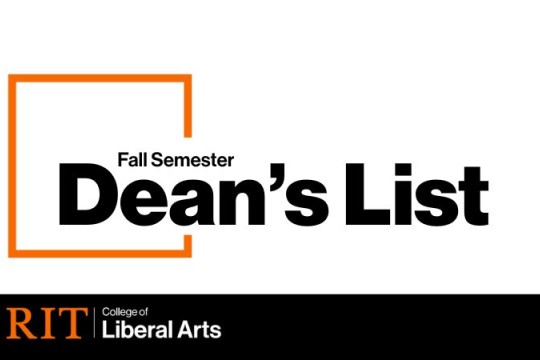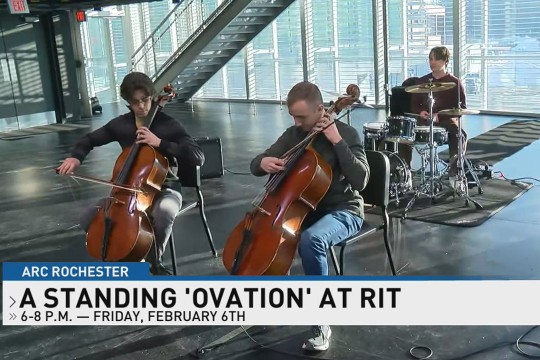Department of Philosophy

Department of
Philosophy
- RIT/
- College of Liberal Arts/
- Academics/
- Academic Departments/
- Department of Philosophy
Overview
The Department of Philosophy offers an undergraduate degree as well as several minors and immersions that can be paired with most other undergraduate degree programs at RIT. Through studying philosophy, you are taught to evaluate complex problems, identify and examine underlying principles, investigate issues from diverse perspectives, and communicate clearly in both written and oral forms. As a result, our students have done extremely well getting into law, business, and graduate school. The department is motivated by a dedication to excellence in teaching and most of our faculty have received awards for their work in the classroom.
Latest News
-
February 10, 2026

RIT College of Liberal Arts Announces Dean’s List for the Fall 2025 Semester
Three hundred and sixty College of Liberal Arts undergraduate students earned a spot on the fall 2025 semester dean's list, including 74 who are double majors with the college.
-
February 2, 2026

RIT preps for Ovation talent show
WHAM-TV highlights the performances that will be showcased at RIT's Performing Arts Showcase, Ovation.
-
November 7, 2025

Seeking Existential Solidarity in the Age of AI
An essay by Evan Selinger, professor of philosophy, published by the American Philosophical Association.
Featured Work and Profiles
-
Meet Afnaan Qureshi, May 2025 Philosophy and Political Science Grad
He had always been an inquisitive and driven person, but at RIT, Afnaan Qureshi discovered that the study of philosophy ignited a special fascination and fueled his thinking in ways other disciplines...
Read More about Meet Afnaan Qureshi, May 2025 Philosophy and Political Science Grad -
Philosophy Grad Makes Positive Impact with a Career in Teaching
“No matter what subject you teach, you are helping the future of our entire nation. The nation may rest in the hands of the future generations, but those future generations are resting on our...
Read More about Philosophy Grad Makes Positive Impact with a Career in Teaching -
Shaping the Future of AI Through Ethical Inquiry and Policy
Evan Selinger Professor Evan Selinger of RIT leads critical discussions on the ethical implications of artificial intelligence, advocating for responsible development and regulation to address potential harms while...
Read More about Shaping the Future of AI Through Ethical Inquiry and Policy -
Exploring Idealism in Modern Philosophy with a New Fellowship
Katie Terezakis Professor Katie Terezakis of RIT's Philosophy Department receives the prestigious John William Miller Fellowship, allowing her to focus on completing her book that explores the relevance of Idealism...
Read More about Exploring Idealism in Modern Philosophy with a New Fellowship -
A Philosophical Mindset for Success
“...To ford through the crazy river that is trying to make your own way in [animation]...there is so much mental battle you have to do, and a foundation of philosophy helps us see where we want to be...
Read More about A Philosophical Mindset for Success
Undergraduate Programs
Students take coursework that provides a solid foundation in core areas of philosophy as well as a four-course specialization that focuses on an area of interest within philosophy, such as applied ethics or the philosophy of art and aesthetics, among others. To build further in-demand skills, a professional or technical core in a discipline outside of philosophy is also required. This can be fulfilled by completing a minor, double major, or other coherent set of courses that fit a particular interest. Options for 4+1 BS/MS with science, technology and public policy, or 4+1 MBA through Saunders College of Business are also available.
Examine complex problems, challenge ideas, and communicate clearly in RIT’s versatile philosophy degree.
Learn more about the Philosophy BS programMinors and Immersions
Employers show a preference for effective communicators with strong analytic or logical reasoning skills. An immersion in analytic and expressive communication provides you with the opportunity to develop both oral and written communication abilities grounded in reasoned argument, which in turn contributes to your individual confidence and empathetic thinking. Courses in this immersion may rely in part upon great or transformative texts selected for their relevance for learning rhetoric, argument, critical thinking, and/or ethics, and have the option to incorporate activities in RIT’s Expressive Communication Center.
Learn more about the Analytic and Expressive Communication Immersion programThe ethics immersion teaches students to identify and critically consider ethical issues on both the theoretical and applied levels, including contemporary issues related to artificial intelligence and emerging technologies. Students gain insights into how ethical problems can emerge from complex social structures and learn how strategic changes in these structures can help prevent ethical dilemmas.
Learn more about the Ethics Immersion programThe ethics minor provides students with the ability to recognize ethical issues and to think critically to resolve them, both generally and within their chosen discipline. Students also learn how ethical problems can result from complex social structures and how changing structural features may avoid ethical problems. Three courses in philosophy are required plus two electives from the approved list, at least one of which must be outside philosophy. Only one 100-level course may be counted as part of the minor.
Learn more about the Ethics Minor programThe global justice immersion examines attempts to create lasting peace and social justice on the international scale. Courses in philosophy and the social sciences help students to understand concepts of human rights, world poverty, and global solidarity. The immersion is well suited for students considering careers in law, politics, or public policy related fields.
Learn more about the Global Justice Immersion programThe philosophy immersion provides students with an opportunity to study the nature, methods, problems, and achievements of philosophical inquiry. The immersion emphasizes the following goals: the ability to think rationally and critically, an awareness of ethical values, an appreciation of aesthetic values, an awareness of how the past affects the present and future, and an understanding of the relationship between individuals and the social settings with which they interact.
Learn more about the Philosophy Immersion programThe philosophy minor provides students with the critical skill of philosophical analysis while they take courses on a wide variety of issues central to everyone’s existence. Students get a solid grasp of the major philosophers, movements, and topics of philosophical debate that continue to shape our lives and how we act.
Learn more about the Philosophy Minor programReligion plays a major role in human affairs. To understand more fully the nature of the relationship between society and the individual, it is essential to have some understanding of religion. The religious studies immersion engages students in the study of religion from the perspective of major Western and non-Western traditions through courses in disciplines such as anthropology, history, literature, philosophy, and psychology.
Learn more about the Religious Studies Immersion program









